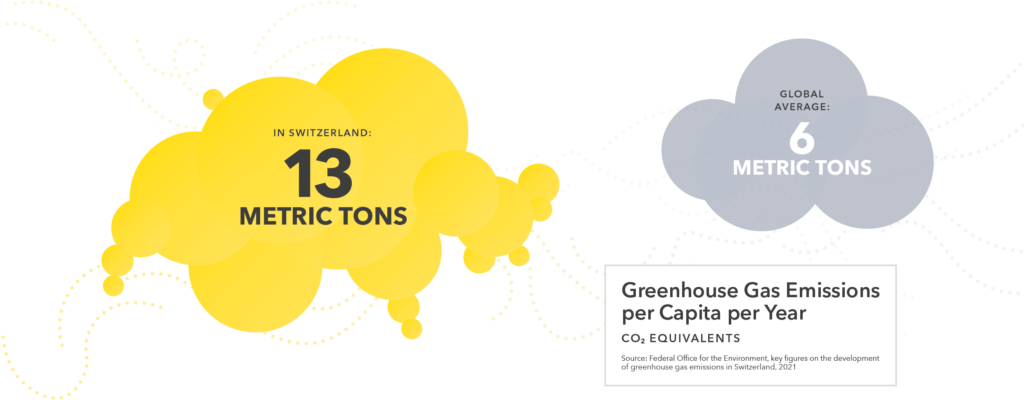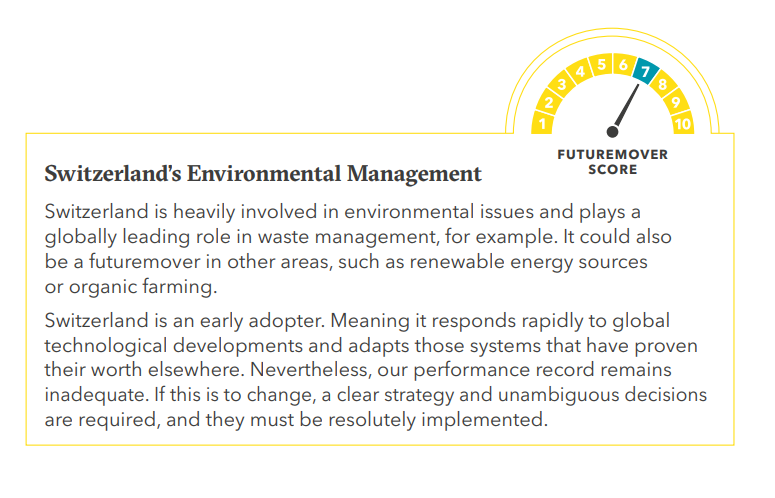News & Trends
Environment: Is Switzerland a Futuremover?

SWITZERLAND HAS ACHIEVED A GREAT DEAL IN RECENT YEARS, particularly with heating systems. But our footprint remains gigantic.
Switzerland is already attempting to exert a positive influence on greenhouse gas emissions by using incentive taxes. One of the cleverest incentives was the CO2 levy on fossil fuels introduced in 2008. It was linked to production targets and has steadily increased in recent years because Switzerland did not achieve the targets. As a result, Switzerland is one of the world’s leading countries in terms of CO2 levies at CHF 120 per metric ton. However, the people rejected extending this to petrol and diesel under the CO2 Act.
Funding Programme Makes an Impact
The government’s funding programme for renewable energy, which provides financial support for the environmentally friendly modernisation of heating systems, is effective as well. In 2022, the greenhouse gas emissions produced from heating buildings were 44 percent lower than in 1990.
We don’t have
Ernst Götsch
to save the planet,
we have to save
ourselves.
Swiss Agronomist in Brazil
Switzerland the Recycling Queen
The polluter pays principle in Swiss waste management has also proven to be an effective means of reducing waste volumes and promoting recycling. By introducing fees based on the amount of waste produced, incentives have been created to avoid waste and to dispose of recyclable materials correctly. As a result of this policy, Switzerland has achieved one of the highest recycling rates in the world.
Switzerland’s Footprint
The date when humanity’s demand exceeds our planet’s biocapacity for the year is called “Overshoot Day”. For Switzerland, that date was 27 May in 2024 — meaning that our consumption is way too high. One third of this is attributed to private transport (31%), followed by food (23%). Services, housing and goods make up the rest. After the financial crisis in 2008, the per capita footprint started to fall slowly, having been at a consistently high level for nearly four decades. This is mainly due to the decarbonisation of heating systems. Nevertheless, the carbon footprint per capita, including imported goods, remains at around 13 metric tons, more than twice the global average of 6 metric tons.

Requirements for Sustainable Environmental Managemen
We must fight climate change in order to restore the balance of nature. Particular attention must be paid to the following key aspects:
RENEWABLE ENERGY
Investments in clean energy sources
Technological innovation
CIRCULAR ECONOMY
Resource conservation
Sustainable production
SUSTAINABLE AGRICULTURE
Organic farming
Biodiversity
ENVIRONMENTAL PROTECTION AND NATURE CONSERVATION
Conservation of natural habitats
Climate action
INFRASTRUCTURE
Green infrastructure
Sustainable mobility
Switzerland In An International Comparison

What We Can Learn from Sweden
While Sweden generates more than 60 per cent of its energy from renewable sources, the figure is less than 30 per cent in Switzerland. Extensive nature conservation measures and a strong climate policy further ensure a reduction in carbon emissions in the Scandinavian model.
Sweden is also an interesting example in terms of green urban development: Stockholm is growing sustainably — and is therefore one of the pioneers among the major cities. In addition to a sophisticated mobility and waste system, a dense district heating network spans the city. This system heats buildings using waste heat from data centres, among other things.

These Are the Challenges to Be Mastered by Switzerland
Long political processes
Long democratic processes often mean years of inaction.
Increasing polarisation
Polarisation between political camps is on the rise.
Energy against landscape conservation
Expanding renewable energy sources conflicts with landscape conservation.

Be part of the solution and stay informed with the Futuremover.
Subscribe now and shape the future!
Magazin abonnieren EN
"*" indicates required fields

Discover the entire issue
Read more articles from our current issue: ‘Is Switzerland a Futuremover?’.



